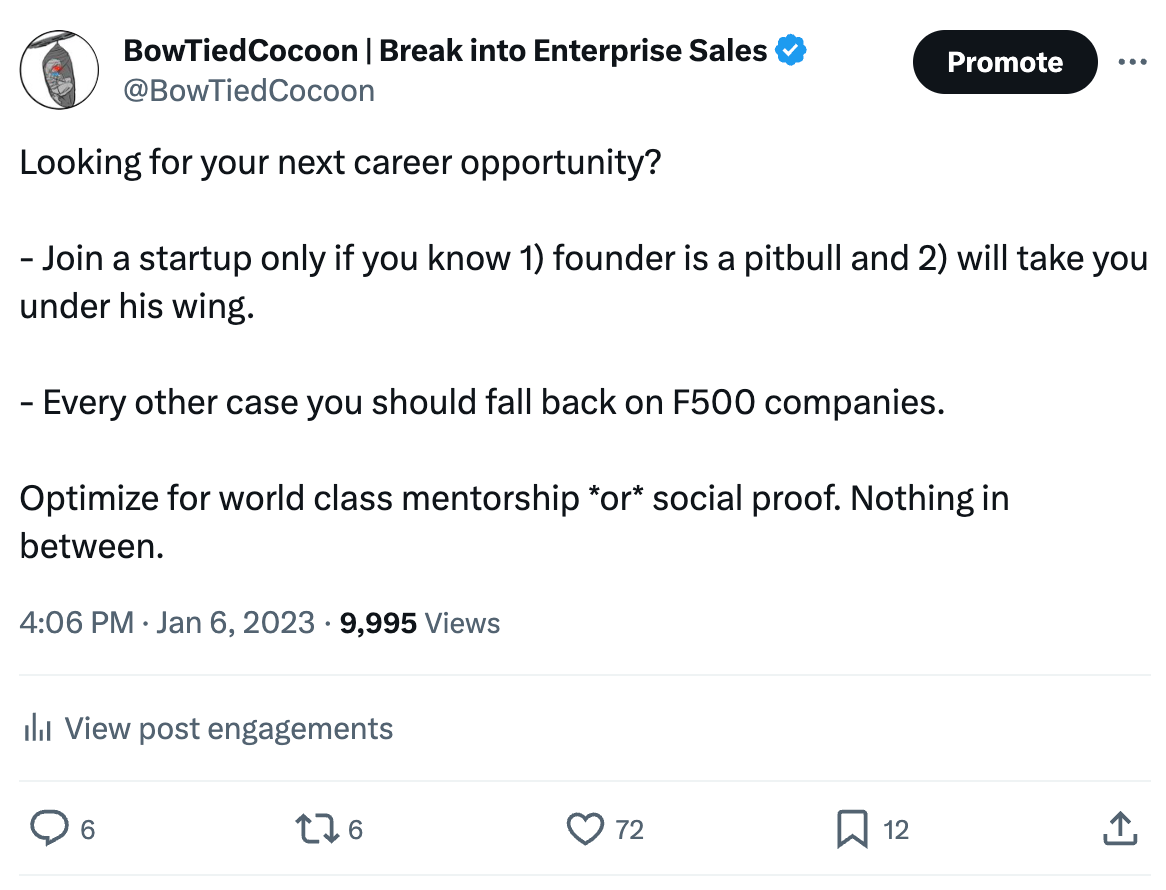Avoid Wasting Years At The Wrong Company
In short. Don't work at a Startup. But if You Do, Read This First.
Everyone knows I discourage gambling years of your time at a startup.
However some of you with less experience will go down that route regardless.
My mentor used to say “You can’t prevent someone from making a mistake they want to make”.
Instead of wasting time convincing you, here are a thing or two you can try to improve your odds of winning at smaller sales organizations.
*rule of thumb: startup that made mainstream media are ok.
Qualify Startups & Small Sales Organizations:
The tricky part about startups is this: unlike F500 companies and Unicorns, there is little to no information to vet sales organizations.
Without a process to qualify startups, you’re essentially gambling away years of your life.
Part 1 - Aggregators, Reviews and Social Proof
Repvue
Go on Repvue.com [Link] and look up the company. The rule of thumb is this: if it shows a rate above 85 *AND* at least 15 votes, you’re good to go.
Glassdoor
Go on Glassdoor.com [Link] and look up the company. The rule of thumb is this: if it shows a rate above 3.5 *AND* at least 30 votes, you’re good to go. There are a lot more fake review on Glassdoor so beware.
Part 2 - Ask the Right Questions During The Interview
If someone ever tells you:“If you’re offered a seat on a rocket ship, don’t ask what seat. Just get on”
You reply: “not so fast Johnny. I got a few questions for you first”
#1 Funding
🐲 You: Mr Hiring Manager, when and how much did you raise last time?
Pro Tip: Raising +$100M *when no one could* (between Nov 21 and Today) does not guarantee success but is a healthy sign. Check Crunchbase or type [Company Name] + “Funding” on google then apply the news filter.
#2 Burn Rate and Company Runway
🐲 You: Mr Hiring Manager, how much time can the business run without external funding ? (or profitability)
Pro Tip: It's not uncommon for SaaS startups to allocate around 50% or more of their total operating expenses to salaries, benefits, and other compensation-related expenses.
Hiring manager might not tell you/know so you should ask clarifying questions about the organizational structure and # of employees.
Example:
Let’s say Startup ABC raised $10M. There are 25 employees, and the average salary is $60,000 — obviously some get more than others but let’s keep it simple:
Annual Burn Rate = 30 employee * $60 0000 * 2 = $3.6M / year
Runway = $10M / $3.6M = 2.7 years
Don’t forget to remove cost of running operations between the moment they raised and today (6 months) — in this example we’re left with ~2Y.
Avoid like the plague organizations below 12-24 months of runway.
#3 Social Proof & Product Maturity
🐲You: What are the 1-2 largest enterprise logo that make up [company name] portfolio? When did the partnerships officialize ? And are those whales still around today?
Pro Tip: No large enterprise client means the product is not ready for the serious money. Also selling without social proof is the best way to set yourself up for failure. The second worse thing is people cancelling their plans once they realize the product is a sham. When that happens, the word gets on the street - then its you that’s on the street.
#4 Talent
🐲You: What organizations do you typically like to hire from? And what’s the average tenure on the sales floor?
Pro Tip: If you're going to gamble the next few years of your life, might as well do it by the side of sharks and industry vets. They might just 1) teach you a thing or two & 2) bring you with them when shit hits the fan (it always does at startups & scale ups). Average tenure informs the culture of the company - average tenure below 18 months means it’s toxic.
#5 Growth
🐲You: How much market share did you have last year ? What’s the target for the current fiscal year? How are you planning on bridging that gap?
Pro Tip: Those that that fail to provide clear answer should also be avoided like the plague since it shows founders are at worse removed or at best terrible at formulating a clear strategy and communicating to their own people. Good answers should include things like geographic expansion, new product release to grow TAM, increasing marketing spent and growing headcount on the sales team etc.
Conclusion:
For every success stories, there are 1000+ sales reps that wasted YEARS they will never get back working at the wrong place (Cocoon exaggerated assumption).
It’s a lot easier to land on the moon by catching a rocket mid-fly than build one from scratch at [insert startup’s name] garage.
Qualifying companies is the best lever one can pull to expedite wealth, skills and overall happiness.
This is easy to do for F500 (and covered extensively in the course). The process is more intricate for Startups but at least now you know a thing or two to challenge them and call out their red flags.
Looking to break into Enterprise sales where entry levels clear 6-figures? Check my course.


